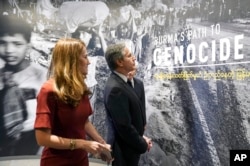Forced to flee ethnic and religious persecution in their own country, Rohingya refugees in Bangladesh are welcoming the formal recognition by the United States that Myanmar's military regime committed genocide against the Muslim minority.
"We are very happy on the declaration of the genocide; many, many thanks," Sala Uddin, a 60-year-old refugee at a camp in Bangladesh, told The Associated Press.
"It has been 60 years, starting from 1962, that the Myanmar government has been torturing us and many other communities including Rohingya," he said. "I think a path to take action by the international community against Myanmar has opened up because of the declaration."
"Rohingya nation will always remember the declaration by the U.S. on Rohingya genocide," Abdul Gafur, another refugee, told VOA's Bangla Service. "Meetings and gatherings are prohibited at the camps because of the pandemic. That is why Rohingyas are not able to observe any program to express their gratitude to the U.S."
Secretary of State Antony Blinken on Monday announced Washington's decision to recognize atrocities against Rohingya Muslims at the hands of the military regime in Myanmar, a country also known as Burma. Monday's formal declaration of genocide — only the eighth ever such statement by the U.S. government — followed years of investigation and review.
"The United States has concluded ... that members of the Burmese military committed genocide and crimes against humanity against Rohingya," Blinken said during a speech at the U.S. Holocaust Memorial Museum in Washington, whose Simon-Skjodt Center for the Prevention of Genocide provided key sources that informed the legal analysis leading to the State Department's decision.
Min Aung Hlaing, who was the head of the military in 2016 and 2017 and who has led the government since the February 2021 coup, was named in Blinken's speech. Monday's declaration said armed forces under Min Aung Hlaing's direct command were responsible for killing more than 9,000 Rohingya and forcing 840,000 others to flee to neighboring Bangladesh over the two-year period.
The commander of Myanmar's armed forces has been under U.S. sanctions for his role in the atrocities since December 2019.
Myanmar's Foreign Affairs Ministry on Tuesday issued a statement saying that "Myanmar has never engaged in any genocidal actions" and holds no "genocidal intent" for any group. It called Blinken's comments "politically motivated and tantamount to interfering in the internal affairs of a sovereign state."
Various human rights groups have also documented and reported on what they have called systematic and widespread killings, rape and displacement of Rohingya minority in Myanmar, a majority of whom are displaced in neighboring Bangladesh. Muslims make up about 4.3% of Myanmar's population of 54 million.
"In 2016 and 2017, Burma's military unleashed a wave of horrific violence in northern Rakhine state against predominantly Muslim Rohingya that, at the time, the United States concluded constituted ethnic cleansing," Ned Price, State Department spokesperson, said Monday.
Accountability
Human rights activists expect the U.S. move to bolster an ongoing effort to hold perpetrators of genocide and other serious crimes accountable and deliver justice and support for the victims. But others are taking a wait-and-see approach.
"Just by saying that genocide had been committed in Myanmar against the Rohingya is not good enough," said Imtiaz Ahmed, director of the Centre for Genocide Studies at the University of Dhaka in Bangladesh. "I think we need to see what would follow from that statement."
Khairul Islam, a Rohingya refugee in Bangladesh, told VOA that "Myanmar should face trial for genocide. There should be economic sanctions to control Myanmar. Otherwise, Myanmar will not listen to anyone. They never did in the past."
The U.S. has imposed sanctions on elements of the Myanmar military and has allocated nearly $1 million in support of investigations and documentation of the most egregious crimes committed in Myanmar.
"The United States is committed to pursuing truth and justice for victims and accountability for those responsible for these atrocities and for other human rights violations and abuses across Burma," Price said.
Last month, the Netherlands-based International Court of Justice resumed its proceedings in a lawsuit accusing Myanmar's military of ethnic cleansing and genocide.
Gambia, backed by the Organization of Islamic Cooperation, filed the lawsuit in 2019.
In December 2019, Myanmar's previous civilian leader, the Nobel laureate Aung San Suu Kyi, defended the military's actions in Rakhine state as a response to "militancy."
Suu Kyi, who was Myanmar's de facto leader at the time of the 2017 massacres, was arrested in the February 2021 coup. She is not named in the decree.
VOA Bangla Service contributed to this story.








